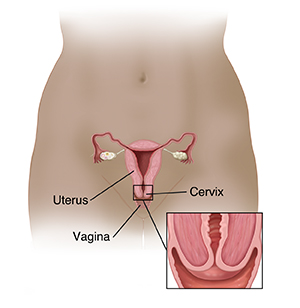A Pap test looks for early signs of cancer in your cervix. Early changes in cervical cells don't cause symptoms. Often the only way to find them is with a Pap test. A Pap test can find these problems early, when they are easier to treat. Pap tests can also find some infections of the cervix and vagina.
What is a Pap test?
A Pap test is a procedure that helps find changes in the cervix that may lead to cancer. The cervix is the part of the uterus that opens into the vagina. For this test, a small sample of cells is taken from the cervix. This is done in your healthcare provider’s office. The cells are then examined in a lab. A Pap test is a safe procedure. It takes just a few minutes and causes little or no discomfort.
The HPV connection
Human papillomavirus (HPV) is a group of viruses that spread through skin contact and sex. Some types cause cell changes (dysplasia) in the cervix that can lead to cancer. In fact, HPV infection is the biggest risk factor for cervical cancer. Healthcare providers can now test for HPV. Testing for HPV is often done with the Pap test. That’s why it’s important to have Pap tests as advised by your healthcare provider. This helps ensure that any abnormal cells will be found. They can be treated before they become cancer.
Who should have a Pap test and an HPV test?
Ask your healthcare provider:
-
When to start having Pap tests
-
If you should have an HPV test at the same time
-
How often to have these tests
The American Cancer Society advises:
-
Have your first Pap test at age
21 , and then every 3 years until age 29. HPV testing is not advised during this time. But it may be done to follow up on an abnormal Pap test. -
Starting at age 30, have a Pap test with an HPV test every 5 years. This should be done until age 65. Another option for people ages 30 to 65 is just the Pap test every 3 years.
-
You may need a different test schedule if you are at high risk for cervical cancer. Risk factors include having HIV, a weak immune system, or exposure to the medicine DES before you were born. Talk with your provider about the best schedule for you.
-
If you’re older than 65, had regular tests for the last 10 years, and no abnormal results in the last
20 years, you may stop the tests. -
If you had a hysterectomy that included removing your cervix, you can stop the tests unless it was done to treat cervical cancer or precancer. If you still have your cervix, you should have tests in line with the above guidelines.
-
Routine tests don't need to be done each year. But if a test is abnormal, your provider will tell you how often to be tested.
-
People who have had the HPV vaccine should still follow these guidelines.
-
If you had cervical cancer, talk with your provider about the test plan that's best for you.
Featured in


